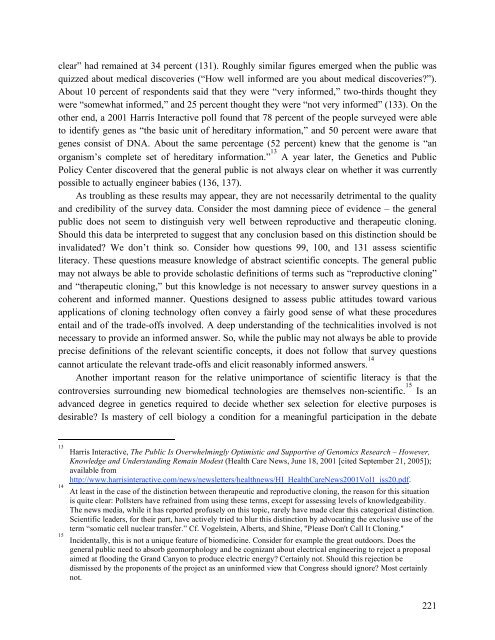Final Report (all chapters)
Final Report (all chapters)
Final Report (all chapters)
You also want an ePaper? Increase the reach of your titles
YUMPU automatically turns print PDFs into web optimized ePapers that Google loves.
clear” had remained at 34 percent (131). Roughly similar figures emerged when the public was<br />
quizzed about medical discoveries (“How well informed are you about medical discoveries?”).<br />
About 10 percent of respondents said that they were “very informed,” two-thirds thought they<br />
were “somewhat informed,” and 25 percent thought they were “not very informed” (133). On the<br />
other end, a 2001 Harris Interactive poll found that 78 percent of the people surveyed were able<br />
to identify genes as “the basic unit of hereditary information,” and 50 percent were aware that<br />
genes consist of DNA. About the same percentage (52 percent) knew that the genome is “an<br />
organism’s complete set of hereditary information.” 13 A year later, the Genetics and Public<br />
Policy Center discovered that the general public is not always clear on whether it was currently<br />
possible to actu<strong>all</strong>y engineer babies (136, 137).<br />
As troubling as these results may appear, they are not necessarily detrimental to the quality<br />
and credibility of the survey data. Consider the most damning piece of evidence – the general<br />
public does not seem to distinguish very well between reproductive and therapeutic cloning.<br />
Should this data be interpreted to suggest that any conclusion based on this distinction should be<br />
invalidated? We don’t think so. Consider how questions 99, 100, and 131 assess scientific<br />
literacy. These questions measure knowledge of abstract scientific concepts. The general public<br />
may not always be able to provide scholastic definitions of terms such as “reproductive cloning”<br />
and “therapeutic cloning,” but this knowledge is not necessary to answer survey questions in a<br />
coherent and informed manner. Questions designed to assess public attitudes toward various<br />
applications of cloning technology often convey a fairly good sense of what these procedures<br />
entail and of the trade-offs involved. A deep understanding of the technicalities involved is not<br />
necessary to provide an informed answer. So, while the public may not always be able to provide<br />
precise definitions of the relevant scientific concepts, it does not follow that survey questions<br />
cannot articulate the relevant trade-offs and elicit reasonably informed answers. 14<br />
Another important reason for the relative unimportance of scientific literacy is that the<br />
controversies surrounding new biomedical technologies are themselves non-scientific. 15 Is an<br />
advanced degree in genetics required to decide whether sex selection for elective purposes is<br />
desirable? Is mastery of cell biology a condition for a meaningful participation in the debate<br />
13<br />
14<br />
15<br />
Harris Interactive, The Public Is Overwhelmingly Optimistic and Supportive of Genomics Research – However,<br />
Knowledge and Understanding Remain Modest (Health Care News, June 18, 2001 [cited September 21, 2005]);<br />
available from<br />
http://www.harrisinteractive.com/news/newsletters/healthnews/HI_HealthCareNews2001Vol1_iss20.pdf.<br />
At least in the case of the distinction between therapeutic and reproductive cloning, the reason for this situation<br />
is quite clear: Pollsters have refrained from using these terms, except for assessing levels of knowledgeability.<br />
The news media, while it has reported profusely on this topic, rarely have made clear this categorical distinction.<br />
Scientific leaders, for their part, have actively tried to blur this distinction by advocating the exclusive use of the<br />
term “somatic cell nuclear transfer.” Cf. Vogelstein, Alberts, and Shine, "Please Don't C<strong>all</strong> It Cloning."<br />
Incident<strong>all</strong>y, this is not a unique feature of biomedicine. Consider for example the great outdoors. Does the<br />
general public need to absorb geomorphology and be cognizant about electrical engineering to reject a proposal<br />
aimed at flooding the Grand Canyon to produce electric energy? Certainly not. Should this rejection be<br />
dismissed by the proponents of the project as an uninformed view that Congress should ignore? Most certainly<br />
not.<br />
221


